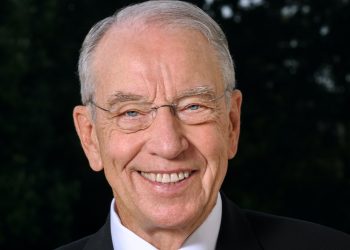DES MOINES, Iowa – U.S. Senator Chuck Grassley, R-Iowa, discussed with The Iowa Torch Democrats’ efforts to revamp federal election law, the Electoral Count Act, and the filibuster during a phone interview on Wednesday.
He said he opposes the Democrat legislation because the Constitution gives state legislatures the power to decide “The Times, Places and Manner of holding Elections for Senators and Representatives.”
Article 1, Section 4 also allows Congress to make or alter regulations passed by the state legislatures except for “places for choosing Senators.” Something Grassley pointed out has been done several times throughout history to make course corrections to expand voting rights and ensure fair elections.
“We amended the Constitution so that you can’t be discriminated on the basis of color for voting. We did it for women in the 19th Amendment. We did it for 18 years old in another constitutional amendment. And then we have voting for president and congressman on the same date, and that’s by law. And then, we have the Voting Rights Act in the 1960s,” Grassley said.
“Except for that, how you hold these elections for 240 years (has) been done by state legislatures. So why would you want a federal law that (for) 240 years it’s been working well for the country?” he asked.
Grassley pointed out that federalizing elections could cause some problems at the state level, with irregularities and fraud, make a national impact.
“Since some states have some irregularities and fraud, I like to use Chicago as an example. So they operate under Illinois law; if you had one federal law, and you had that sort of fraud and irregularities, it would dilute the value of an Iowa vote. Where now, that dilution is restricted entirely to diluting the vote of anybody voting in Illinois,” he said.
Grassley was also concerned about the proposed legislation eliminating voter ID, even though it is widely supported, using taxpayer money to fund campaigns and it creates a “presidential slush fund to promote democracy.”
“What is that all about?” he asked.
Grassley said that he believes changes to the Electoral Count Act, originally passed in 1886, need to be made. That law was central to the debate whether or not Vice President Mike Pence could reject a state’s electors when presiding over congressional certification of the Electoral College.
“I haven’t seen any suggestions on how it ought to be changed yet, although there are people in the Congress working on that very point. And I think it would get broad bipartisan support. Now whether I would vote for it, I’d want to read the legislation first,” he told The Iowa Torch.
He said it is important to remember that Republicans are not the only ones questioning election results.
“When you hear about the 2020 election, and the Democrats say that we need national voting laws and do away with the states. They’re complaining because there was questions raised by Republican senators about maybe the election being stolen from from Trump. You never hear about the last three times a Republican was elected. The Democrats did exactly the same thing,” Grassley asserted. “And it just irritates me that we don’t hear the press talking about that. And that’s not a criticism of you local people, but it seems like the New York Times and CNN and Washington Post have forgotten about those things.”
On January 6, 2021, 139 Republican members of the U.S. House of Representatives and eight Republican U.S. Senators voted to reject electors. Whereas, on January 6, 2017, only seven Democrat members of the U.S. House offered challenges, but since no U.S. Senator joined those objections, there was no debate.
On January 6, 2005, there was a challenge to Ohio’s electoral results, and 31 Democrat members of the U.S. House and 1 Democrat member of the U.S. Senate voted to reject Ohio’s electors.
There were also 12 House Democrats who objected to Florida’s electors on January 6, 2001, but they did not have Senate support, so there was not a debate.
Discussing the filibuster, Grassley observed that Democrats have a short memory. For example, it wasn’t until 2003 when judicial nominations were filibustered regularly “because Democrats got mad at Bush.”
Democrats then eliminated the filibuster for lower court judges in 2013 and said Republicans warned “this is a slippery slope” and then reminded them of that when Republicans ended the filibuster for Supreme Court justices.
Grassley said he’s reminding Democrats about that again.
“Well, that’s exactly what we’re telling the people right now, you want to do this just for a voting law. You can’t expect a rule to apply to one side but not the other. And you’re going to be in the minority sometime, and you’re going to regret it,” he said.
Senate Democrats on Wednesday night failed to eliminate the filibuster on a 48 to 52 vote, U.S. Senators Joe Machin, D-W.Va., and Krysten Sinema, D-Ariz., voted with Republicans opposing the proposed rule change.














